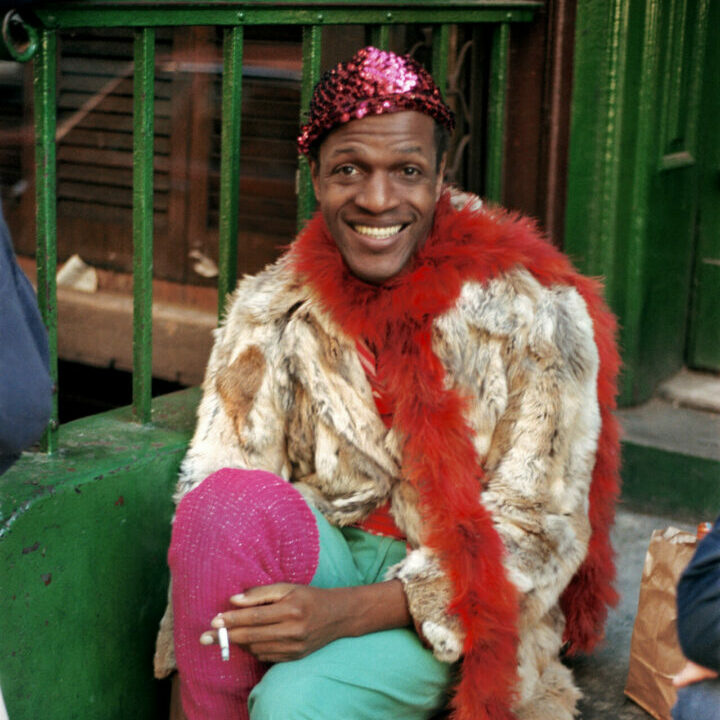Read more:
† 06.07.1992 in New York City
Nationality at birth: American
Nationality at death: American
Alberta Claiborne
Malcom Michaels
6 siblings
Place of the fight for human rights: New Jersey, New York City
| Area | Type | From | To | Location |
|---|---|---|---|---|
| 1963 | Graduation from Edison High School | New Jersey | ||
Street Transvestite Action Revolutionaries (STAR)
Location: New York CityReason for entry: Supporting the LGBTQ-Community
Function / Activity:
STAR-House
Location: New York CityReason for entry: Founding of a home for gay and trans youth and adults
Function / Activity: Founder of the home together with longtime friend Sylvia Rivera
Gay Liberation Front (GLF)
Location: New York CityReason for entry: Working to make gay youth and adults more visible in society
Function / Activity:
- Participating in the Stonewall-Riots
Location: New York CityReason for entry:
Function / Activity: Fighting against police violence and discrimination
Reason for entry:
Function / Activity:
Leitmotif
Marsha fought for the rights of the LGBTQ community in New York City in the 1960s and 1970s and fought against racism and discrimination, especially from the government and police.
How did the story become known?
Marsha was already very well known within the LGBT community while being alive. On 6 July 1992, Marsha was found dead in the Hudson River, New York. The cause of death was unclear, which enraged the LGBTQ community and led to demonstrations with the slogan ‘Justice for Marsha’.
When did the story become known?
Marsha became particularly well known in 1969 after actively resisting police violence as part of the Stonewall riots.
Where did the story become known?
First in New York, later worldwide.
By whom did the story become known?
he story became known through stories by and interviews with Marsha’s friends, acquaintances and family, and more recently through the Netflix documentary: „The death and life of Marsha P. Johnson.“
Literature (literature, films, websites etc.)
Films
France, David. “The death and life of Marsha P. Johnson”, 2017.
Right to life, freedom and security
Freedom of expression
To help shape the public order
Right to social security
Right to participate in cultural life, freedom of science and education

INTRODUCTION
Marsha P. Johnson, born on 24 August 1945 as Malcolm Michaels Jr. in Elizabeth, New Jersey was a prominent figure in the LGBTQ movement in the USA and is now considered one of the movement’s most important 20th century activists. Marsha P. Johnson was not only an activist, but also a passionate drag queen and artist.
Please note: During the research of this story, close friends of Marsha P. Johnson pointed out to us that Marsha P. Johnson “was not Trans…. and never stopped being Malcolm”. As Marsha P. Johnson can no longer provide details of preferred pronouns, we have chosen not to use pronouns at all in this article. An exception are direct quotes from other people about Marsha P. Johnson.
THE STORY
The first years
Johnson grew up in New Jersey as the child of Alberta Claiborne (housekeeper) and Malcom Michaels (assembly line worker) with 6 siblings. Marsha started wearing dresses as a child and was laughed at by other school children for it. Marsha’s parents also reportedly had difficulty accepting Marsha’s identity and appearance, based on their faith. As a result, Johnson was forced to wait until adulthood to express Marsha’s identity.
Nach dem Abschluss an der Edison High School im Jahr 1963 entschied sich Marsha P. Johnson im Alter von 17 Jahren dazu, die Heimat zu verlassen. Mit 15 US-Dollar und einer Handvoll Kleidung machte Marsha sich auf den Weg ins New Yorker Homosexuellenviertel Greenwich Village und nahm dort zunächst das Pseudonym “Black Marsha” an. Da Johnson noch kein Geld verdiente, aber den eigenen Unterhalt zahlen musste, ging Marsha der Prostitution nach. Wenig später machte Marsha P. Johnson zum ersten Mal als Drag-Queen auf sich aufmerksam. (Rothberg, 2020)
After graduating from Edison High School in 1963, Johnson decided to leave home at the age of 17. With 15 US dollars and a handful of clothes, Marsha arrived at New York’s homosexual district Greenwich Village, where Johnson initially adopted the pseudonym “Black Marsha”. Since Marsha did not yet earn any money but had to pay rent, Marsha went into prostitution. A short time later, Marsha P. Johnson first attracted attention as a drag queen. (Rothberg, 2020)
Marsha P. Johnson
Marsha changed her official name from Malcom Michaels Jr. to Marsha P. Johnson. The P in her name stood for „Pay it no mind“. Marsha deliberately chose the P to be able to answer sarcastically to the many questions about Marsha’s gender.
Resistance and Activism
In the 1960s and 1970s, Marsha P. Johnson became a particularly important figure in New York City’s LGBTQ community.
Johnson regularly frequented the Stonewall Inn (a bar for gay men, but also for women and drag queens). In the early hours of 28 June 1969, Johnson was staying at the Stonewall Inn when the police raided it. Violent confrontations between the police and patrons of the establishment ensued over several days. Johnson was a big part of the Stonewall uprising and resisted the injustices together with fellow activists : “We destroyed cars and blocked the street” (Marsha in an interview about the clashes) (France, 2017).
However, Marsha claims to have arrived at the Stonewall Inn after the raid had already started:
„I was uptown and I didn’t get downtown until about two o’clock, because when I got downtown the place was already on fire. And it was a raid already. The riots had already started. And they said the police went in there and set the place on fire. They said the police set it on fire because they originally wanted the Stonewall to close, so they had several raids.”
– Marsha P. Johnson (O’Neill, 2019)
Today, the Stonewall riots are seen as a turning point in the struggle for queer visibility and are also the starting point for the annual Pride Month in June.
In 1970, Johnson founded the activist group Street Transvestite Action Revolutionaries (STAR) together with Marsha’s good friend Sylvia Rivera (US gay and trans rights activist). The group advocated for homeless trans people and drag queens and sought to make the LGBT community, and trans people in particular, more visible and empowered.
That same year, Johnson and Rivera co-founded STAR House, a home for gay and trans youth and adults. Until Marsha’s death, Marsha emphasised that Rivera had the main responsibility for this project: “I am only the vice-president of the STAR House, Sylvia the president” (Marsha on Rivera after the founding of the STAR House) (France, 2017). In addition, Johnson became involved in the Gay Liberation Front (GLF). The GLF was a political group of gays which advocated for the visibility of gays and lesbians and was formed through the 1969 Stonewall Uprising (Walsh, 2019).

Image 1: The Stonewall Inn in July 2022.
Marsha as an artist
Marsha P. Johnson was a passionate artist who used art and creativity to fight for the rights of the LGBTQ community. Marsha was known for colourful and unusual costumes. In 1974, Johnson modelled for the now famous American artist Andy Warhol and was part of his Polaroid series (Rothberg, 2020). Furthermore, Marsha was part of the drag performance group Hot Peaches, founded by Jimmy Camicia. “The first time I saw Marsha, she was all dolled up with feathers and make-up that never sat right” (Kitty Rotolo on her then good friend Marsha) (France, 2017).
Marsha P. Johnson’s death
Despite the significant contribution to human rights, Johnson’s life was marked by a struggle with homelessness, poverty and also mental health problems. By 1966, Marsha was living on the streets and earning money through prostitution. Stress and anger, as well as doggedness, occasionally got to Marsha. Despite everything, Johnson always managed to bring joy to others. “Marsha was very affable and funny. But she had no shortage of seriousness and political will” (Karla Jay, co-founder of the LGBTQ movement) (France, 2017). Agosto Machado (co-founder of the LGBTQ movement) also expressed that Marsha’s mission at all times was to spread peace and friendship (France, 2017).
Marsha P. Johnson was found dead in the Hudson River in New York City on 6 July 1992. Today, there are conflicting opinions as to who the last person was to see Marsha alive. Initially, Marsha P. Johnson’s death was dismissed as a suicide, but friends and family were certain that Marsha had been the victim of a violent crime. Today, Marsha P. Johnson’s death is still considered unexplained (Rothberg, 2020).
Sylvia Rivera said after Marsha’s death: “She is not here but she is here in spirit. I’ll not forget the movement for anything they have done to my community” (France, 2017). Rivera died of liver cancer in 2002 at the age of 50.
Aftermath
Today, Marsha P. Johnson is considered a key figure in the LGBTQ movement and a significant human rights activist. After Marsha’s death, numerous people demonstrated on the Hudson River under the slogan „Justice for Marsha“.
Over the years, Marsha P. Johnson has received numerous honours and recognitions. In 2017, for example, the documentary “The death and life of Marsha P. Johnson” was released on Netflix (France, 2017). Marsha was also honoured with a memorial in Greenwich Village near the Stonewall Inn in New York in 2019 and with a number of murals, and in 2021 German singer Sarah Lesch drew attention to Marsha’s death with the song „The Story of Marsha P. Johnson“ (Caldart, 2022).
Marsha’s struggle for justice and equality continues to inspire activists today. Johnson’s unexplained death infuriates members of the community, and questions continue to be raised about why so little was done by the police to determine the exact cause of death. “The police didn’t care, it was all about ‘trannies'” (statement by a contemporary witness) (France, 2017). In addition, there was always the suspicion that the mafia (as an enemy of the LGBTQ movement) might have something to do with Marsha’s death. “Marsha was very afraid of the mafia” (Randy Wicker, former friend of Marsha) (France 2017; Simon, 2017).
The quote by Marsha P. Johnson at the beginning of this article is still sadly relevant today: “As long as my people don’t have their rights all across America, there‘s no reason for celebration.”

© Gun Roze
Author: Amelie Späth
Contact: info@buxus-stiftung.de
Images:
Header: Sahra Barkini, Beobachter News (SWB GmbH)
Portrait Picture: Courtesy of Gun Roze
Image 1: Karly Jones, Unsplash
Sources:
http://www.back2stonewall.com/2023/06/pride-history-remembering-marsha-p.html
https://www.youtube.com/watch?v=IcN5FSl9aWI (Sarah Lesch)
https://outhistory.org/exhibits/show/tgi-bios/marsha-p-johnson
Caldart, Isabella. Frankfurter Rundschau. 5. Juli 2022. https://www.fr.de/panorama/spaete-wuerdigung-einer-fruehen-queen-91649621.html
France, David. The Death and Life of Marsha P. Johnson. 2017. Film.
O’Neill, Shane. The New York Times. 31. Mai 2019. https://www.nytimes.com/2019/05/31/us/first-brick-at-stonewall-lgbtq.html
Rothberg, Emma. National Women’s History Museum. 2020. https://www.womenshistory.org/education-resources/biographies/marsha-p-johnson
Simon, Carolyn. Human Rights Campaign. 29. September 2017. https://www.hrc.org/news/the-cold-case-of-an-lgbtq-pioneer-marsha-p-johnson
Walsh, Colleen. The Harvard Gazette. 27. Juni 2019. https://news.harvard.edu/gazette/story/2019/06/harvard-scholars-reflect-on-the-history-and-legacy-of-the-stonewall-riots/
All links: last retrieved 25.07.2023






